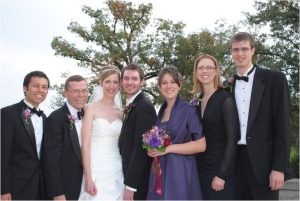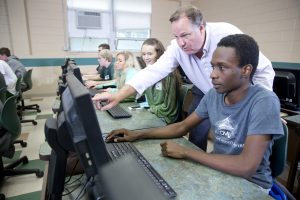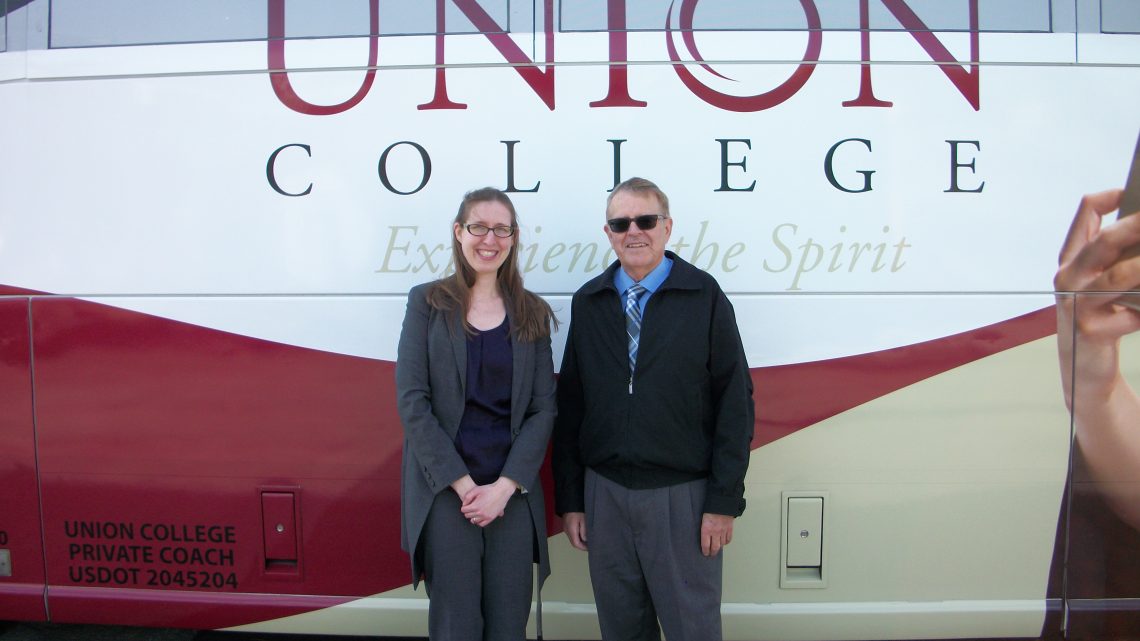Education is a lifelong process. During my time as a college professor at Southern Adventist University, I tried to be an inspirational teacher. I wanted my students to gain tools that would help them continue to explore the world around them from a biblical perspective.
As I think back to my time as a student to see what made teachers stand out – in a good or bad way – to me, I remember the teachers who inspired me to learn, the same teachers that I have aspired to be like. Four main themes come to mind.
Passion for Christ
From elementary school through high school, I attended Adventist schools. My dad teaches at Central Methodist University, a small liberal arts Christian college in Missouri. Since tuition there would be free for me, I decided to attend his school for my freshman year. Even though CMU is a Christian school, most of the students were coming from public schools and had little exposure to the Intelligent Design evidence I had been exposed to my entire life.
My General Chemistry teacher, Dr. James Gordon, often added bits of evidence that made it clear that chemistry did not happen by random chance or accident. He invited students to his home for Bible studies and introduced me to Lee Strobel’s book, A Case for Christ. It was his class that made me realize that science is a mission field and that I wanted to be a teacher.
Though CMU is a great school, I ended up transferring to Union College after one year. It was not until my junior year that I had a class from Dr. Ben Thornton. It was clear to me and to anyone else who has experienced one of his worship talks, that Dr. Thornton loves Jesus and wants his students to get to know the Savior better.
I was privileged to become a colleague of Ben’s at SAU and enjoyed hearing more of his stories and seeing God work through him. On an ecology trip to the Bahamas, he and his students even went door-to-door taking blood pressure as a humanitarian service.
Passion for Students
There’s a well known adage that says people don’t care about what you know until they know how much you care. I have seen this to be true. Students are more motivated to engage in classes when they believe their instructor cares about them.
My year at CMU was difficult. I didn’t know anyone besides my dad (and your dad doesn’t exactly help you make friends in college) and the transition from high school to college is a difficult one for most students and was for me. Barely an adult, I was now expected to make decisions that would affect the rest of my life.
I don’t remember how she befriended me because I never had a class from biology teacher, Dr. Regina Grindstaff, but she certainly helped make the transition for one lost freshman a little easier. Anytime I would stop by her office, Dr. Grindstaff would stop whatever she was doing and give me her full attention.
Having now been a teacher, I know that she must have been very busy but she always took time to make me feel important.
Showing me that she cared about me made a world of difference and I wish I had been able to take a class from her.
When I arrived at Union the next year, the late Dr. Charles Freidline (a beloved Chemistry teacher known for Millie the Mole and Leo the Lion) reached out to me. He had worked at CMU for many years before coming to Union and being able to talk about our former school and some of our mutual acquaintances was really helpful. Since I had already taken “G Chem”, I never had a class from Dr. Freidline but had the privilege of grading for him. He, like Dr. Grindstaff, would always stop whatever he was doing and give visiting students his full attention.
Dr. Freidline wrote a poem for every science major accepted into graduate school. I know I have treasured mine and I bet that many others still have theirs.
Once I stopped by Dr. Freidline’s office after taking an important test. I was discouraged because I felt like I had failed. He told me a story about when he was in school taking a test in an advanced science course. When he got the test, he scanned to see if he knew how to do any of the problems. He didn’t but began working on each one bit by bit, doing what he could. When the teacher collected the tests, he knew he had failed. He was correct in that aspect; he did get a failing grade on the test. But it turned out that his 40-something percent had been the highest in the class. His story encouraged me to do my best and not to worry until there was something to worry about. And as it turned out, I had not failed my test after all.
Passion for the Subject Matter
My dad, Professor Eric Robinette, loves math. On road trips when my brother and I were growing up (and even now though we are adults), my dad would give us math problems like, “If we are going 65 mph and we are 100 miles from our destination, what time – to the minute – will we arrive?” He was always right on and it wasn’t until later that I realized he could adjust his speed a little at the end to make his predictions always come true. He would teach us tricks for doing hard problems in our head and I was very thankful for his help when I was taking Geometry and Algebra in high school.
My freshman year at CMU, I took College Algebra from my dad. Just like with any math or science class, there were many students who didn’t want to be there at all or didn’t care what they learned as long as they got their A’s. One class period, one such student raised her hand and asked, “How does this formula apply to real life?” My dad got an excited look on his face and immediately launched into an example off the top of his head of a situation that did in fact use the formula in real life. I could tell the girl was impressed, and so was I.
My dad also teaches Computer Science (and I was also able to take C++ from him) and assigns problems to students that require them to get data from real life and apply it. His students can tell he likes what he is doing and it rubs off.
I took Christian Beliefs my sophomore year at Union from Dr. Tom Shepherd. I can still remember him asking the class in a positive upbeat voice, “Did you bring your Bible to Bible class?” Dr. Shepherd is clearly in love with the Word of God and practices what he preaches. In his classes, he even offered one “gracified” homework assignment where you could turn it in late, no questions asked. Dr. Shepherd‘s passion for the Scripture was so inspiring that I chose to take two other classes from him and am so glad I did.
Dr. Shepherd is also a world class story teller. In class, we loved it when he would launch into a story. I had the privilege of touring with Dr. Shepherd in the Golden Chords String Quartet, a musical ministry team with a quartet and pianist that included an artist and a student missionary (me). We traveled to many churches around the Mid-America Union and gave one-hour long programs. Dr. Shepherd would tell the children’s story during each program and even though I heard his stories dozens of time, they never ceased to captivate me. In his story about the 10 virgins awaiting the bridegroom, his yawn during the story was so convincing that even though I knew it was coming, it made me yawn every time!
Challenging but with Clear Expectations
When I transferred to Union, I signed up for Microeconomics as an elective. Little did I know that Dr. George Gibson was notorious for being one of the most difficult Humanities teachers. I ended up loving the class (and it certainly didn’t hurt that it didn’t have a lab like most of my science classes). I had to study but Dr. Gibson let us know what he expected and with hard work, I was able to get an A in the course.
I still remember that macroeconomics is what the economy does to you and microeconomics is what you do to the economy by choosing where (and when) to spend your money. I also still think of things in terms of marginal costs and benefits when making important decisions. I loved the class so much I chose to take two other history classes from Dr. Gibson and I still have a vivid interest in history that I attribute to him.
Dr. Don Abbey, another professor I had my first semester at Union, was also one who was difficult but gave clear expectations. He was always encouraging but expected us to do our part to succeed. In my Ecology class, he took us seining and when I ended up getting pulled into the water up to my neck, Dr. Abbey just laughed and told me that I got an A for the day!
Both Ecology and Genetics (which I took the following semester) had essay exams that Dr. Abbey administered during labs to give us more time. My hand would hurt after writing for 1.5 hours straight but I knew that his questions would always be graded fairly and that they were always representative of the material that we had covered in class.
Dr. Abbey ended up being my advisor and after learning that I wanted to teach Biology, he gave me job assignments with increasing responsibility. He allowed me to be a TA for him in General Biology when typically instructors choose students who have taken the class from them directly (I took “GB” at CMU). Later when a new teacher arrived, he suggested that he let me be in charge of the Drosophila (fruit fly) experiments. Dr. Abbey also let me help him make and grade tests. When I became a teacher, I was more confident in my abilities due to the experience Dr. Abbey had given me.
These eight teachers made a difference to me in school and have continued mentoring me even after I graduated. While I chose to put each of them into one of my four themes, they could have easily fit into some of the other categories.
I have also had many other teachers who met the above characteristics; these eight were just the first ones who came to mind when I thought of the great educational experiences that I have had. Great teachers challenge students while being on fire for God, the students, and their subject matter.
Just imagine if we had more teachers like that!
Valerie Lee teaches Anatomy & Physiology and is the Career Center Coordinator at Union College. She loves to write and has written two books for young people: one about her time as a student missionary in Kenya and one for students experiencing the loss of a loved one.
Photos: Courtesy Valerie Lee

Tom Shepherd (second from left) and other members of the Golden Chords String Quartet, a Union College musical group who performed at Valerie’s wedding.

Eric Robinette, Valerie’s dad, is a professor of math and computing at Central Methodist University.










